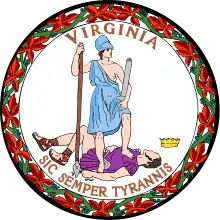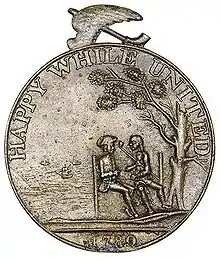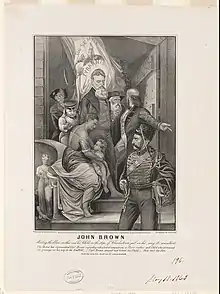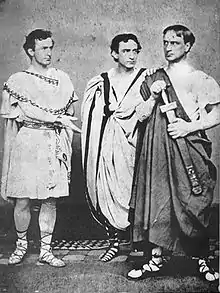Sic semper tyrannis
Sic semper tyrannis is a Latin phrase meaning "thus always to tyrants". It suggests that bad but just outcomes should or eventually will befall tyrants.
History
Before 509 BC, Rome was ruled by kings. The last was Lucius Tarquinius Superbus. The king's son, Sextus Tarquinius, raped a noblewoman, Lucretia, who revealed the offence to various Roman noblemen and then died by suicide. The noblemen obtained the support of the aristocracy and the people to expel the king and his family and to institute the Roman Republic. The leader of the noblemen was Lucius Junius Brutus, who became one of the first consuls of the Republic. It has been suggested that the phrase was used at this event, but the suggestion is not based on any literature of the time.
A descendant of Brutus was Senator Marcus Junius Brutus, who was present at the assassination of Julius Caesar on 15 March 44 BC.[1][2] While he is sometimes credited with originating the phrase, Plutarch suggests he either did not have a chance to say anything, or if he did, no one heard it:
Caesar thus done to death, the senators, although Brutus came forward as if to say something about what had been done, would not wait to hear him, but burst out of doors and fled, thus filling the people with confusion and helpless fear.[3]
The phrase has been invoked, in Europe and elsewhere, as an epithet about one allegedly abusing power, or as a rallying cry against abuse of power.
Usage in the United States

The phrase was recommended by George Mason to the Virginia Convention in 1776, as part of the commonwealth's seal. The Seal of the Commonwealth of Virginia shows Virtue, spear in hand, with her foot on the recumbent form of Tyranny, whose crown lies nearby. The Seal was planned by Mason and designed by George Wythe, who signed the United States Declaration of Independence and taught law to Thomas Jefferson.[4] A joke referencing the image on the seal that dates as far back as the Civil War, is that "Sic semper tyrannis" actually means "Get your foot off my neck."[5]
"Happy While United" was the slogan on a medal coined by the State of Virginia in 1780. First envisioned by Thomas Jefferson, the medal was minted and designed to be given to Indian signatories to the treaties Jefferson planned with the First Peoples of Virginia. The medal portrays a Virginia colonial, sitting, enjoying a peace pipe with a Native American. The obverse portrays a variation of the Virginia state seal of the state symbol standing triumphant over a slain enemy with the legend: "Rebellion to Tyrants Is Obedience to God".
The phrase is the motto of the United States Navy attack submarine named for the state, the USS Virginia. Before that, it was the motto of the nuclear-powered cruiser USS Virginia.
The phrase appears on the Insignia of the 149th Fighter Squadron which is located at Joint Base Langley–Eustis, Virginia.
 Great Seal of Virginia with the commonwealth's motto.
Great Seal of Virginia with the commonwealth's motto. Reverse
Reverse
John Tyler's father, John Tyler Sr. uttered the phrase to a schoolteacher who had been tied up by Tyler and his fellow pupils.[6]



In 1859, after John Brown was executed following his raid on Harpers Ferry, his failed attempt to free America's slaves, much to the disgust of Virginians he was portrayed by abolitionists as the rebel, against Virginia the tyrant. As put by Wendell Phillips in a well-attended speech, reported on the front page of the New York Herald the day of Brown's execution,
It is a mistake to call him an insurrectionist. He opposed the authority of the Commonwealth of Virginia. The Commonwealth of Virginia!—there is no such thing. There is no civil society, no government; nor can such exist except on the basis of impartial equal submission of its citizens—by a performance of the duty of rendering justice between God and man. The government that refuses this is none but a pirate ship. Virginia herself is to-day only a chronic insurrection. I mean exactly what I say—I consider well my words—and she is a pirate ship. John Brown sails with letters of marque from God and Justice against every pirate he meets. He has twice as much right to hang Governor Wise as Governor Wise has to hang him.[7]
A version of Virginia's seal, with an exclamation point added to "tyrannis", appears on the title page of Brown's first biography, that of James Redpath. A famous Currier and Ives print, whose original is now lost, portrays John Brown as a Christ-like figure, and around his head, as a halo, is a version of the flag of Virginia and "Sic semper tyrannis".
During the Civil War, at least one regiment of the United States Colored Troops used it as their motto.[8]
John Wilkes Booth wrote in his diary that he shouted "Sic semper tyrannis" after shooting U.S. President Abraham Lincoln on April 14, 1865, in part because of the association with the assassination of Caesar.[9][10][11] The phrase was also in the pro-Confederate Civil War song "Maryland, My Maryland", which was popular at the time with Southern sympathizers in Maryland, such as Booth. The song, containing the phrase, is now the official state song of Maryland.
Timothy McVeigh was wearing a T-shirt with this phrase and a picture of Lincoln on it when he was arrested on April 19, 1995, the day of the Oklahoma City bombing.[12]
The phrase is also the motto of the U.S. city Allentown, the third largest city in Pennsylvania.
See also
References
- Mitgang, Herbert (12 April 1992). "Booth Speech Reveals a Killer's Mind". The New York Times. Retrieved 23 November 2015.
- Mulvihill, Amy (13 April 2015). "The Fault in His Stars". Baltimore Magazine. Retrieved 23 November 2015.
- Plutarch, "Caesar", Plutarch's Lives, with an English Translation by Bernadotte Perrin. Cambridge, MA. Harvard University Press. London. William Heinemann Ltd. 1919. ch. 67. On Line text.
- Rowland, Kate Mason (1892). The Life of George Mason, 1725-1792. G.P. Putnam's Sons. pp. 264–265.
- von Borcke, Heros (April 1866). "Memoirs of the Confederate War for Independence". Blackwood's Edinburgh Magazine. American edition, vol. 62. New York: Leonard Scott & Co. 99 (606): 462. Retrieved 21 August 2010.
...the coat of arms of the state of Virginia, bearing the motto, Sic semper tyrannis, which the soldiers translated, "Take your foot off my neck", from the action of the principal figure ... representing Liberty, who, with a lance in her right hand, is standing over the conquered and prostrate tyrant, and apparently trampling on him with her heel.
- "From Classroom to White House". google.co.uk.
- "Extraordinary address of Wendell Phillips on the insurrection". New York Daily Herald. November 2, 1859. p. 1 – via newspapers.com.
- "USCT Regimental Flag – 22nd United States Colored Infantry". Jubilo! The Emancipation Century.
- "Diary Entry of John Wilkes Booth". umkc.edu. Archived from the original on 2010-12-29.
- "TimesMachine April 15, 1865 - New York Times". The New York Times.
- "Ford's Theater Historic Site Visit". fords.org.
- Kilzer, Lou; Flynn, Kevin (1997-12-19). "Did McVeigh Plan to get Caught, or was he Sloppy?". Denver Rocky Mountain News.
External links
- Webster entry - audio pronunciation